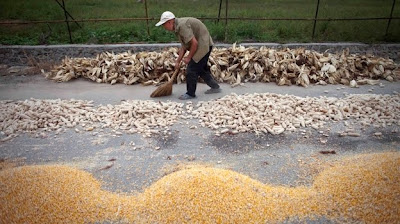
Without exception, our abuses to the planet always seem to come back to bite us, and this time, they've taken a bite out of our food supply.Scientists have long predicted that — eventually — temperatures and altered rainfall caused by global climate change would take a toll on four of the world's most important staple crops: rice, wheat soy and corn. Most inconveniently,as world grain prices soar near record highs, a new study reveals that these effects are starting to be felt.
According to Wolfram Schlenker, a teacher environmental economics and coauthor of the study, for two crops, corn and wheat, there has actually been a steady decline in yields over the past 30 years. The scientists looked specifically at places in the world where warming trends are most pronounced and, sure enough, they found these staple crops weren't doing quite as well. For rice and soy, declines in some places were offset by productivity boosts elsewhere in the world, so there was no overall change. But they did see a change for wheat and corn. The losses caused by warming thus far are still smaller than the gains made though improved agriculture, but rather than seeing gains in yield, as would be expected form the improvements, yields are only managing to remain stable.
The study, published online by Science magazine, shows that these crops have declined about 5 percent over what they would have been in the absence of warming. That sounds small, until you consider that globally, these crops are worth about a trillion dollars a year. And according to Gerald Nelson at the International Food Policy Research Institute in Washington, D.C., as the planet heats up in the coming decades, the 5 percent loss seen today could easily grow to 20 percent. No small change, if you ask me.
To add insult to injury, most of these yield problems hit people who can afford it the least. Those Who hurt most are people who spend the greatest portion of their income on food, and in developing countries, this can be as high as 40% annually. Here in the United States, a doubling of wheat prices might only add, say, a dime to the cost of a $2 loaf of bread, but double the price of rice and people who fill their food bowl with that grain every day will really feel it.
Americans are also insulated from this effect for another reason. The new study found that the effects of warming have not been felt evenly around the world, since the temperature trends themselves are not evenly distributed.And since America's breadbasket has not warmed significantly, American grain farmers have been fortunate. Professor Gene Takle at Iowa State University says farmers in the Midwest have actually dealt with a long-term trend of additional rainfall in that area.
Midwestern farmers have adapted to the added wetness by spraying more pesticides to control fungus, by planting more per acre, and by buying bigger machines to cope with the wetter fields. But there are limits, and many other farmers around the world are already starting to find out where those limits lie as they confront higher temperatures.
According to Wolfram Schlenker, a teacher environmental economics and coauthor of the study, for two crops, corn and wheat, there has actually been a steady decline in yields over the past 30 years. The scientists looked specifically at places in the world where warming trends are most pronounced and, sure enough, they found these staple crops weren't doing quite as well. For rice and soy, declines in some places were offset by productivity boosts elsewhere in the world, so there was no overall change. But they did see a change for wheat and corn. The losses caused by warming thus far are still smaller than the gains made though improved agriculture, but rather than seeing gains in yield, as would be expected form the improvements, yields are only managing to remain stable.
The study, published online by Science magazine, shows that these crops have declined about 5 percent over what they would have been in the absence of warming. That sounds small, until you consider that globally, these crops are worth about a trillion dollars a year. And according to Gerald Nelson at the International Food Policy Research Institute in Washington, D.C., as the planet heats up in the coming decades, the 5 percent loss seen today could easily grow to 20 percent. No small change, if you ask me.
To add insult to injury, most of these yield problems hit people who can afford it the least. Those Who hurt most are people who spend the greatest portion of their income on food, and in developing countries, this can be as high as 40% annually. Here in the United States, a doubling of wheat prices might only add, say, a dime to the cost of a $2 loaf of bread, but double the price of rice and people who fill their food bowl with that grain every day will really feel it.
Americans are also insulated from this effect for another reason. The new study found that the effects of warming have not been felt evenly around the world, since the temperature trends themselves are not evenly distributed.And since America's breadbasket has not warmed significantly, American grain farmers have been fortunate. Professor Gene Takle at Iowa State University says farmers in the Midwest have actually dealt with a long-term trend of additional rainfall in that area.
Midwestern farmers have adapted to the added wetness by spraying more pesticides to control fungus, by planting more per acre, and by buying bigger machines to cope with the wetter fields. But there are limits, and many other farmers around the world are already starting to find out where those limits lie as they confront higher temperatures.
No comments:
Post a Comment